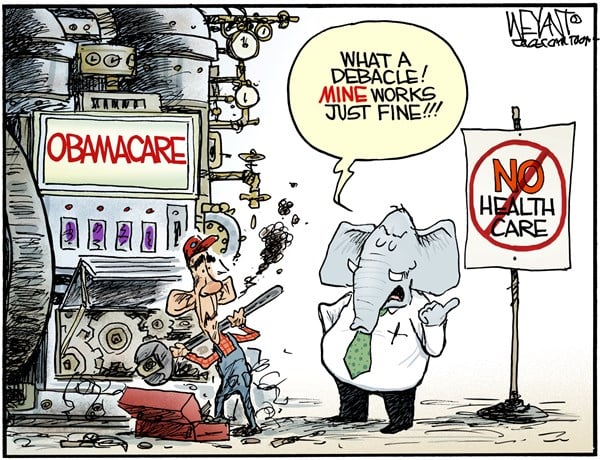Two Deeper Issues to Consider
So, I’m a little behind the curve on this one, as it happened in the late morning of October 24th and has been blogged and tumbl’d and tweeted about a bajillion times and now is a week old and largely forgotten… but that’s all right, since my blogging is all about providing long-view context and a unique perspective, not about news.
If you missed it last Thursday (10/24/2013) the House Energy and Commerce Committee held a hearing on the healthcare.gov glitches so

they could grandstand, bloviate on issues they don’t understand and mug for the cameras. Congressman Frank Pallone (D – New Jersey’s 6th Congressional district) did some counter-trolling to the GOP trolling over the web site and privacy, saying “No, I will not yield to this monkey court or whatever this thing is,” which quickly went viral and was clipped on every news site and inspired a flood of tweets with the hashtag #monkeycourt. Trolling against your opponents’ trolling…it’s pretty much the most we can expect from our Congress right now. That’s the surface of the story, though I admit I found committee chairman Joe Barton’s hasty response “this is not a monkey court”—in a tone not entirely convinced himself—to be hiiiilarious (judge for yourself) but…
what’s the deeper context most news media isn’t giving you?
1) The content of this House Energy and Commerce Committee hearing consisted of questions not grounded in facts about web sites and internet tech, followed by answers just as unmoored from web reality. This spectacle of a hearing/monkeycourt was every bit as indicative of Congress’ tech ignorance as then-Senator Ted Stevens’ infamous the internet is “a series of tubes“ remark, and it ought to be seen in that light.
Web entrepreneur Clay Johnson—@cjoh—provided some real substance on the oft-ignored web dev issues at the heart of the healthcare.gov problems when he was interviewed by Democracy Now! the day following the hearing. Johnson pointed out that a core problem is Congress’ cluelessness around the subject matter at issue:
…so, you have these bizarre exchanges where, you know, a member of Congress is asking the vice president of CGI Federal about code inside of the website that isn’t even being displayed and isn’t even relevant to the user, and CG—and the VP of CGI Federal not even recognizing that it’s not displayed and not even relevant to the user. It was this really baffling set of exchanges. It’s like watching my one-year-old argue with my cat.
He also revealed that “Congress lobotomized itself” on technological issues when—under the direction of Speaker Gingrich—it canceled the Office of Technology Assessment (OTA), zeroing it out in the FY 1996 budget, so it had to close September 29th, 1995; significantly, this “defunding” was part of the dramatic budget cuts that triggered the battle over spending and government shutdown of 1995-96. Because of the OTA’s absence, Johnson explains, Congress doesn’t have the kind of consistent advice it needs to understand the myriad of technology needs and requirements that crop up in the legislation that’s voted on each session. Clearly, our members of Congress are left to rely on the advice of their staffers, which obviously can be uneven and/or skewed. Read or listen to the rambling “series of tubes” remarks, spoken by the late Ted Stevens—then-Senate president pro-tem—and it’s apparent he was clumsily repeating parts of the party line on net neutrality, but interpreting it through his own very unique imagery, “…again, the Internet is not something that you just dump something on. It’s not a big truck. It’s a series of tubes. And if you don’t understand, those tubes can be filled….” etc., and lots of the substance is getting “lost in translation.” See and/or hear the comments Clay Johnson gave to Democracy Now! in full below:
2) the power, sweeping purview and deep-seated corruption of these House committees deserves coverage. The House Energy and Commerce Committee oversees the health care industry along with Medicaid and Medicare and the implementation of the ACA, the energy sector—oil, coal, natural gas, etc., plus renewables—and other, enormously important, broad swaths of our socio-economic existence, including trade policy and the numerous ways that federal law regulates markets. Run by the GOP Majority via committee chairman Joe Barton (representing mostly rural parts of Texas with more cows than voters) this committee has been accumulating power since 1795. In 1885, Woodrow Wilson wrote about the out-of-control power and corruption of these long-standing House committees:
[the House of Representatives]…divided up, as it were, into forty-seven seignories, in each of which a Standing Committee is the court-baron and its chairman lord-proprietor. These petty barons, some of them not a little powerful, but none of them within reach [of] the full powers of rule, may at will exercise an almost despotic sway within their own shires, and may sometimes threaten to convulse even the realm itself.
—Woodrow Wilson, Congressional Government, p. 76
Congressional Government (1885), Woodrow Wilson’s John Hopkins University doctoral dissertation, became popular in the study of U.S. government and politics and has been published in many different editions. Wilson’s scholarship aimed to Having long-since lapsed into the public domain, Congressional Government is available in full online: wikisource hosts its 15th (1900) edition.
Obviously many aspects of Wilson’s presidency were problematic to say the least, but that doesn’t zero-out the insights from Wilson’s writings and scholarly works. On his study of the federal government and its flaws, he aimed to be descriptive not prescriptive: “I am pointing out facts—diagnosing, not prescribing remedies.” His diagnosis of the House committee system was that its “barons” are out of control, exercising enormous power nationally without any national or in-House accountability, without checks and balances at all aside from the dude’s constituents’ power to reelect, and without competitive pressure as the chair is given on the basis of seniority not merit. This empowers said dukes and duchesses to act in the shadows, wield power in so corrupt a fashion it’d even make Lucifer blush, all because of the absence of mechanisms to impose repercussions.
The structural defects Wilson described in 1885 continue today, only more so, as the committees’ respective scopes of operations has continually expanded, including more and more of the economy (and more industries to shake down for campaign contributions). Joe Barton himself is the epitome of the corrupt committee chairman, just turn over the log and ewwww….
The questions need to be asked, loudly and repeatedly: should the committee system stay as-is in the 21st century? Should their fiefdoms include like half the economy? and if they are to have such a vast, national scope, can we—the people—vote for the chairs nationally on a quadrennial basis like the presidents? or at least subject the chairs to a competitive vote of the Congressmen like the way that the Speaker of the House is elected? Unlike the role of Speaker of the House, however, the committees are not in the U.S. Constitution, just look in Article One. That makes reforming the committees more like the ongoing debate over filibuster reform, it’s about modernizing arcane rules and traditions that are increasingly prone to abuse.
We desperately need to address the flaws in the underpinning governing structure of our system. Unfortunately the two parties don’t typically invite discussion of root and branch reforms that may remove some of the ill-gotten gains from the top of the heap they trade off controlling.
I’ll conclude on another quote from Wilson: “We know that the machines of both parties are subsidised by the same persons, and therefore it is useless to turn in either direction.” -from p. 27 of Wilson’s The New Freedom (1912) full text available online.
Nick

